Effective Talent Management Strategies in the Hospitality Sector
VerifiedAdded on 2023/01/16
|20
|3079
|76
Project
AI Summary
This research project critically examines effective talent management strategies within the hospitality industry, specifically focusing on Marriott International. The project begins by outlining aims, objectives, and a project management plan, including a WBS and Gantt chart. It then delves into both secondary and primary research, employing qualitative methods and inductive approaches to data collection through questionnaires and thematic analysis. The findings reveal insights into employee experience, the benefits of talent management, effective strategies like cultivating career paths, and obstacles to employee retention, such as higher job opportunities. The project concludes with recommendations for improving talent management and evaluating the research tools' authenticity. The project covers various themes including employee satisfaction, challenges in retaining talent, and the impact of talent management strategies on employee performance and business productivity, offering valuable insights for the hospitality sector.
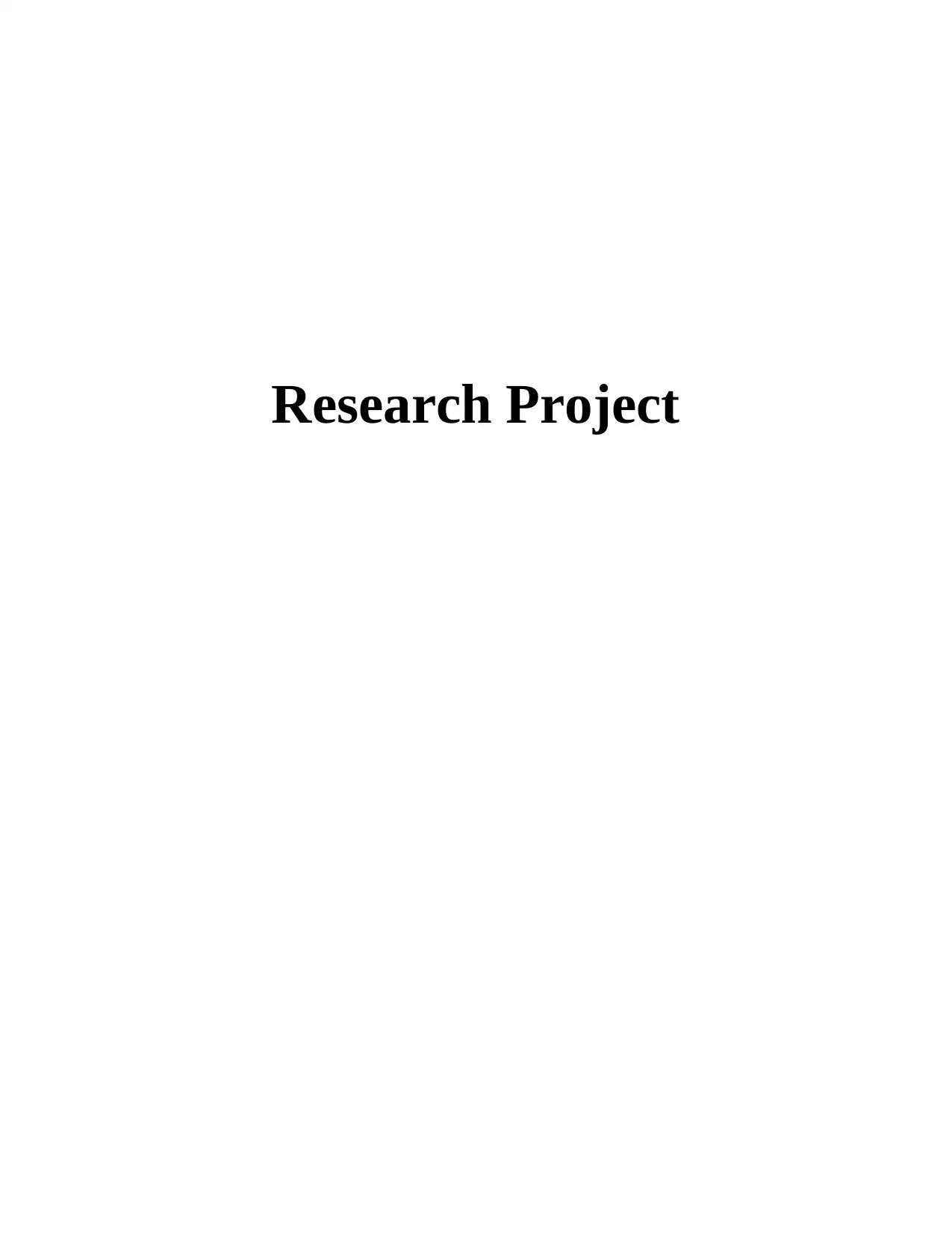
Research Project
Paraphrase This Document
Need a fresh take? Get an instant paraphrase of this document with our AI Paraphraser
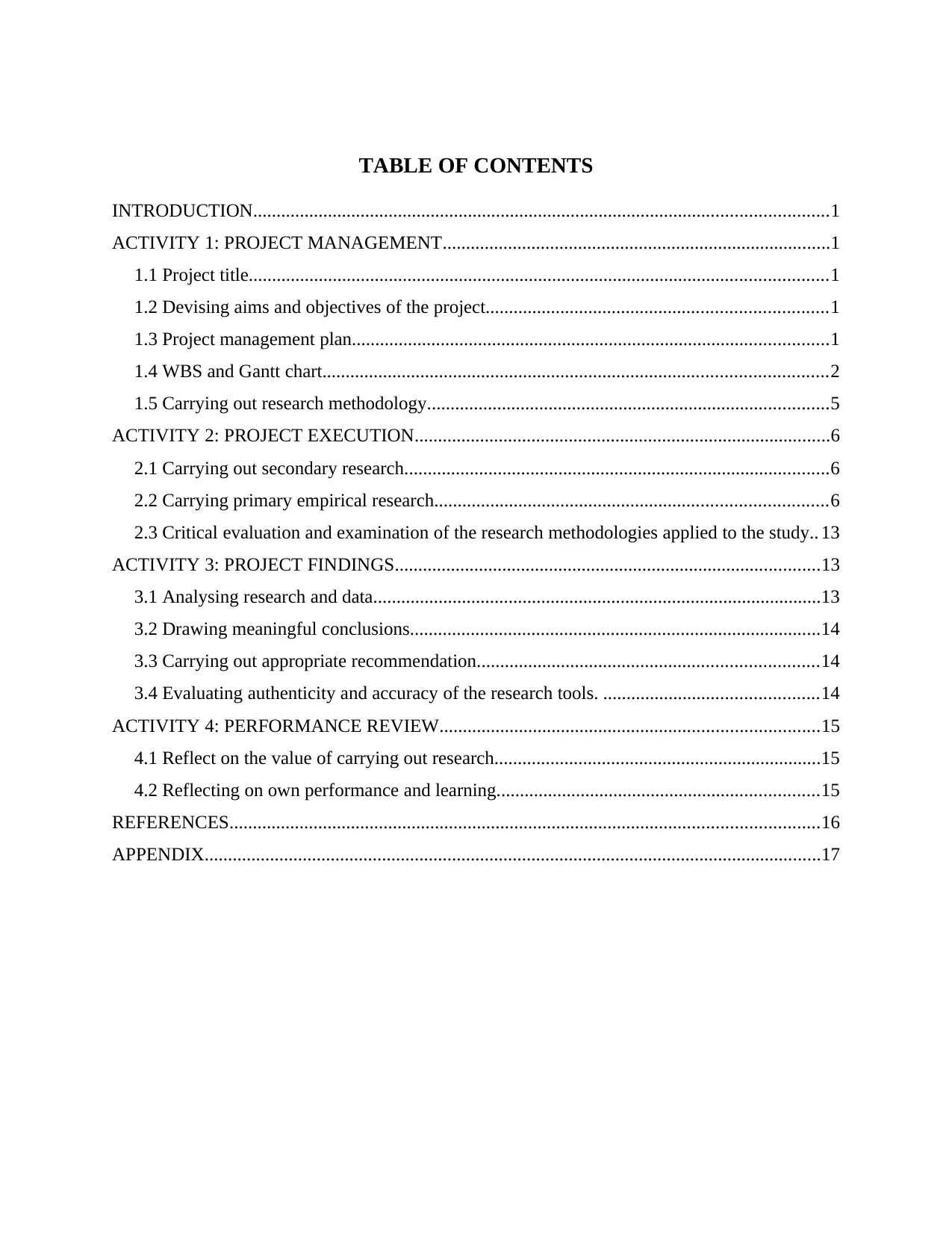
TABLE OF CONTENTS
INTRODUCTION...........................................................................................................................1
ACTIVITY 1: PROJECT MANAGEMENT...................................................................................1
1.1 Project title............................................................................................................................1
1.2 Devising aims and objectives of the project.........................................................................1
1.3 Project management plan......................................................................................................1
1.4 WBS and Gantt chart............................................................................................................2
1.5 Carrying out research methodology......................................................................................5
ACTIVITY 2: PROJECT EXECUTION.........................................................................................6
2.1 Carrying out secondary research...........................................................................................6
2.2 Carrying primary empirical research....................................................................................6
2.3 Critical evaluation and examination of the research methodologies applied to the study.. 13
ACTIVITY 3: PROJECT FINDINGS...........................................................................................13
3.1 Analysing research and data................................................................................................13
3.2 Drawing meaningful conclusions........................................................................................14
3.3 Carrying out appropriate recommendation.........................................................................14
3.4 Evaluating authenticity and accuracy of the research tools. ..............................................14
ACTIVITY 4: PERFORMANCE REVIEW.................................................................................15
4.1 Reflect on the value of carrying out research......................................................................15
4.2 Reflecting on own performance and learning.....................................................................15
REFERENCES..............................................................................................................................16
APPENDIX....................................................................................................................................17
INTRODUCTION...........................................................................................................................1
ACTIVITY 1: PROJECT MANAGEMENT...................................................................................1
1.1 Project title............................................................................................................................1
1.2 Devising aims and objectives of the project.........................................................................1
1.3 Project management plan......................................................................................................1
1.4 WBS and Gantt chart............................................................................................................2
1.5 Carrying out research methodology......................................................................................5
ACTIVITY 2: PROJECT EXECUTION.........................................................................................6
2.1 Carrying out secondary research...........................................................................................6
2.2 Carrying primary empirical research....................................................................................6
2.3 Critical evaluation and examination of the research methodologies applied to the study.. 13
ACTIVITY 3: PROJECT FINDINGS...........................................................................................13
3.1 Analysing research and data................................................................................................13
3.2 Drawing meaningful conclusions........................................................................................14
3.3 Carrying out appropriate recommendation.........................................................................14
3.4 Evaluating authenticity and accuracy of the research tools. ..............................................14
ACTIVITY 4: PERFORMANCE REVIEW.................................................................................15
4.1 Reflect on the value of carrying out research......................................................................15
4.2 Reflecting on own performance and learning.....................................................................15
REFERENCES..............................................................................................................................16
APPENDIX....................................................................................................................................17
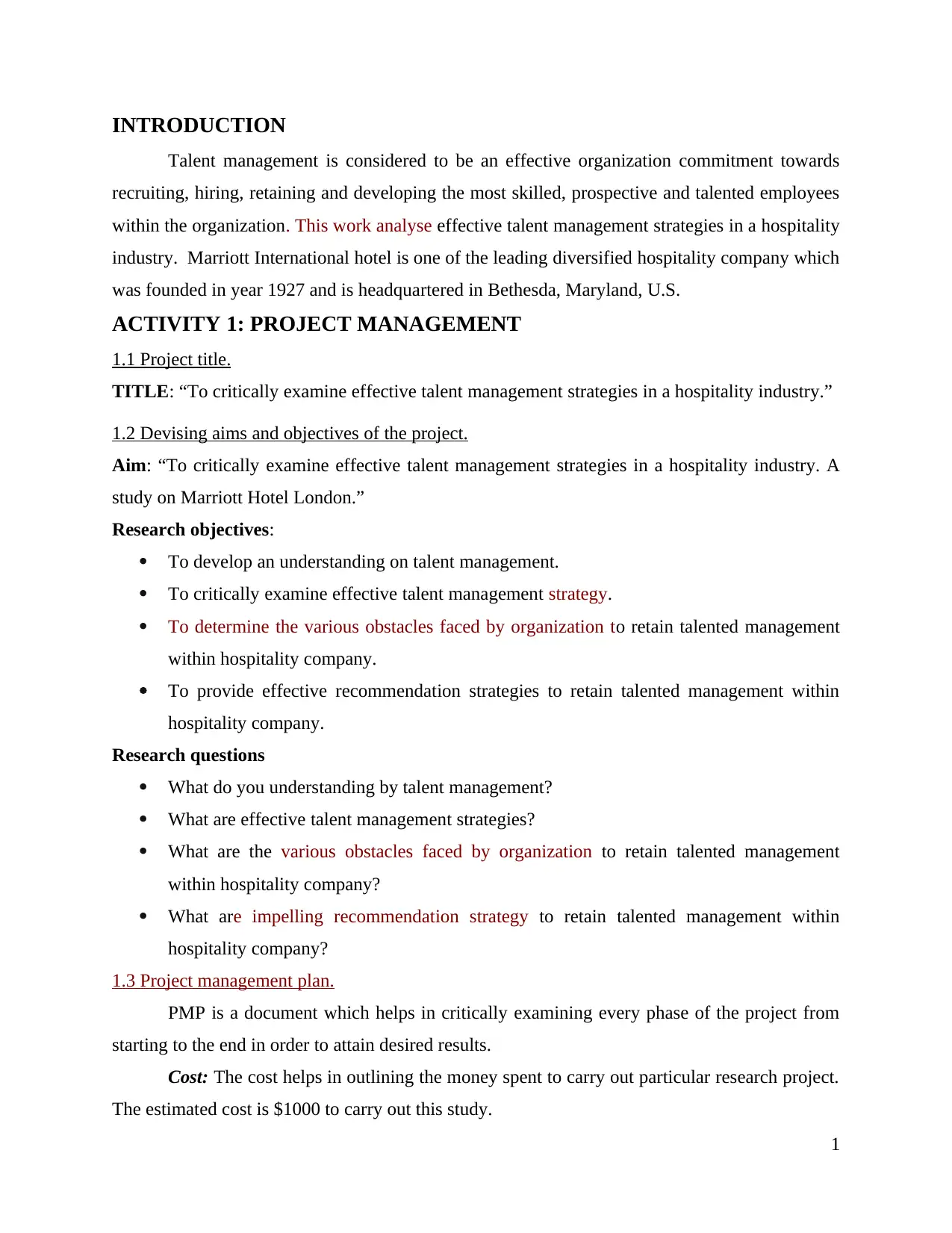
INTRODUCTION
Talent management is considered to be an effective organization commitment towards
recruiting, hiring, retaining and developing the most skilled, prospective and talented employees
within the organization. This work analyse effective talent management strategies in a hospitality
industry. Marriott International hotel is one of the leading diversified hospitality company which
was founded in year 1927 and is headquartered in Bethesda, Maryland, U.S.
ACTIVITY 1: PROJECT MANAGEMENT
1.1 Project title.
TITLE: “To critically examine effective talent management strategies in a hospitality industry.”
1.2 Devising aims and objectives of the project.
Aim: “To critically examine effective talent management strategies in a hospitality industry. A
study on Marriott Hotel London.”
Research objectives:
To develop an understanding on talent management.
To critically examine effective talent management strategy.
To determine the various obstacles faced by organization to retain talented management
within hospitality company.
To provide effective recommendation strategies to retain talented management within
hospitality company.
Research questions
What do you understanding by talent management?
What are effective talent management strategies?
What are the various obstacles faced by organization to retain talented management
within hospitality company?
What are impelling recommendation strategy to retain talented management within
hospitality company?
1.3 Project management plan.
PMP is a document which helps in critically examining every phase of the project from
starting to the end in order to attain desired results.
Cost: The cost helps in outlining the money spent to carry out particular research project.
The estimated cost is $1000 to carry out this study.
1
Talent management is considered to be an effective organization commitment towards
recruiting, hiring, retaining and developing the most skilled, prospective and talented employees
within the organization. This work analyse effective talent management strategies in a hospitality
industry. Marriott International hotel is one of the leading diversified hospitality company which
was founded in year 1927 and is headquartered in Bethesda, Maryland, U.S.
ACTIVITY 1: PROJECT MANAGEMENT
1.1 Project title.
TITLE: “To critically examine effective talent management strategies in a hospitality industry.”
1.2 Devising aims and objectives of the project.
Aim: “To critically examine effective talent management strategies in a hospitality industry. A
study on Marriott Hotel London.”
Research objectives:
To develop an understanding on talent management.
To critically examine effective talent management strategy.
To determine the various obstacles faced by organization to retain talented management
within hospitality company.
To provide effective recommendation strategies to retain talented management within
hospitality company.
Research questions
What do you understanding by talent management?
What are effective talent management strategies?
What are the various obstacles faced by organization to retain talented management
within hospitality company?
What are impelling recommendation strategy to retain talented management within
hospitality company?
1.3 Project management plan.
PMP is a document which helps in critically examining every phase of the project from
starting to the end in order to attain desired results.
Cost: The cost helps in outlining the money spent to carry out particular research project.
The estimated cost is $1000 to carry out this study.
1
⊘ This is a preview!⊘
Do you want full access?
Subscribe today to unlock all pages.

Trusted by 1+ million students worldwide
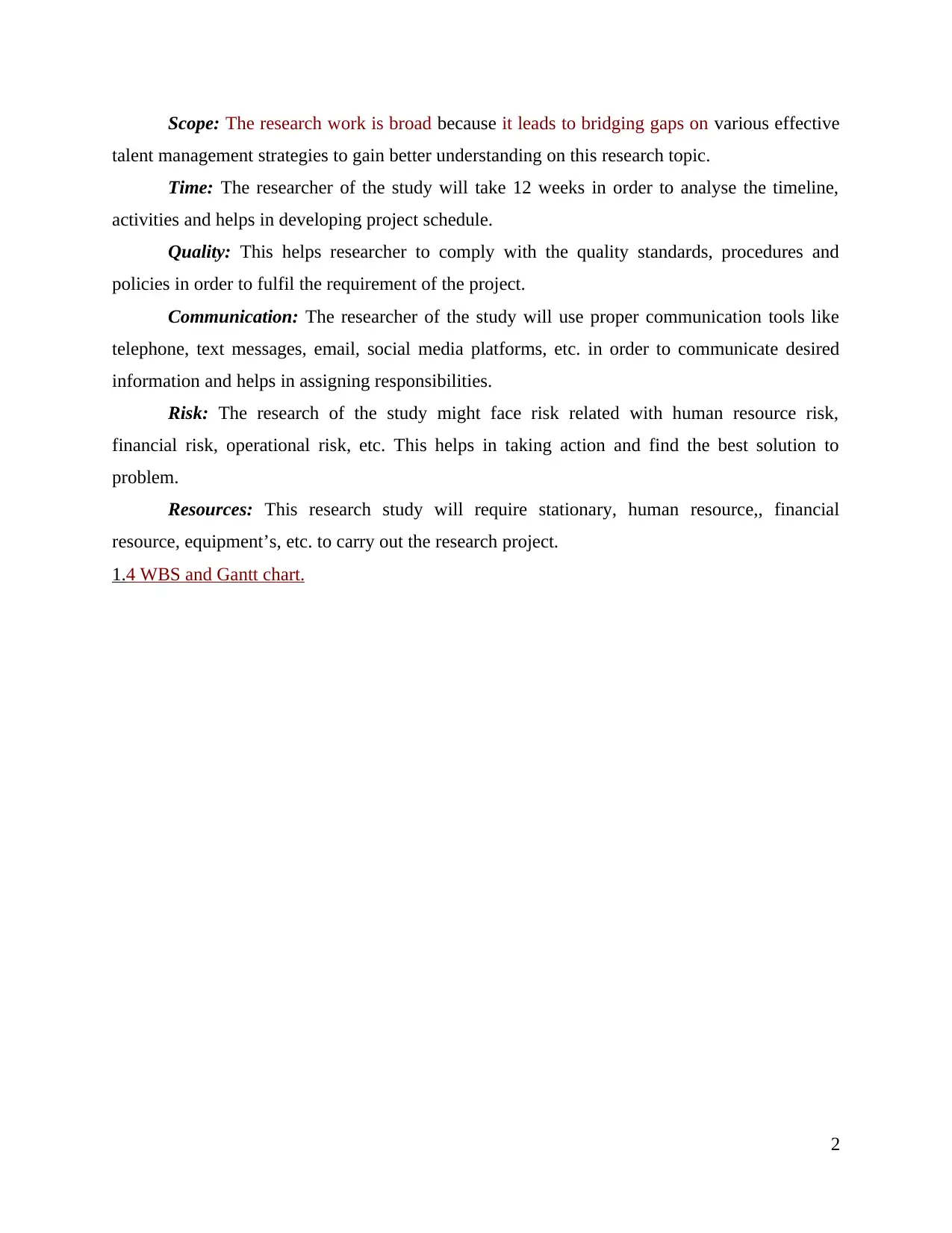
Scope: The research work is broad because it leads to bridging gaps on various effective
talent management strategies to gain better understanding on this research topic.
Time: The researcher of the study will take 12 weeks in order to analyse the timeline,
activities and helps in developing project schedule.
Quality: This helps researcher to comply with the quality standards, procedures and
policies in order to fulfil the requirement of the project.
Communication: The researcher of the study will use proper communication tools like
telephone, text messages, email, social media platforms, etc. in order to communicate desired
information and helps in assigning responsibilities.
Risk: The research of the study might face risk related with human resource risk,
financial risk, operational risk, etc. This helps in taking action and find the best solution to
problem.
Resources: This research study will require stationary, human resource,, financial
resource, equipment’s, etc. to carry out the research project.
1.4 WBS and Gantt chart.
2
talent management strategies to gain better understanding on this research topic.
Time: The researcher of the study will take 12 weeks in order to analyse the timeline,
activities and helps in developing project schedule.
Quality: This helps researcher to comply with the quality standards, procedures and
policies in order to fulfil the requirement of the project.
Communication: The researcher of the study will use proper communication tools like
telephone, text messages, email, social media platforms, etc. in order to communicate desired
information and helps in assigning responsibilities.
Risk: The research of the study might face risk related with human resource risk,
financial risk, operational risk, etc. This helps in taking action and find the best solution to
problem.
Resources: This research study will require stationary, human resource,, financial
resource, equipment’s, etc. to carry out the research project.
1.4 WBS and Gantt chart.
2
Paraphrase This Document
Need a fresh take? Get an instant paraphrase of this document with our AI Paraphraser
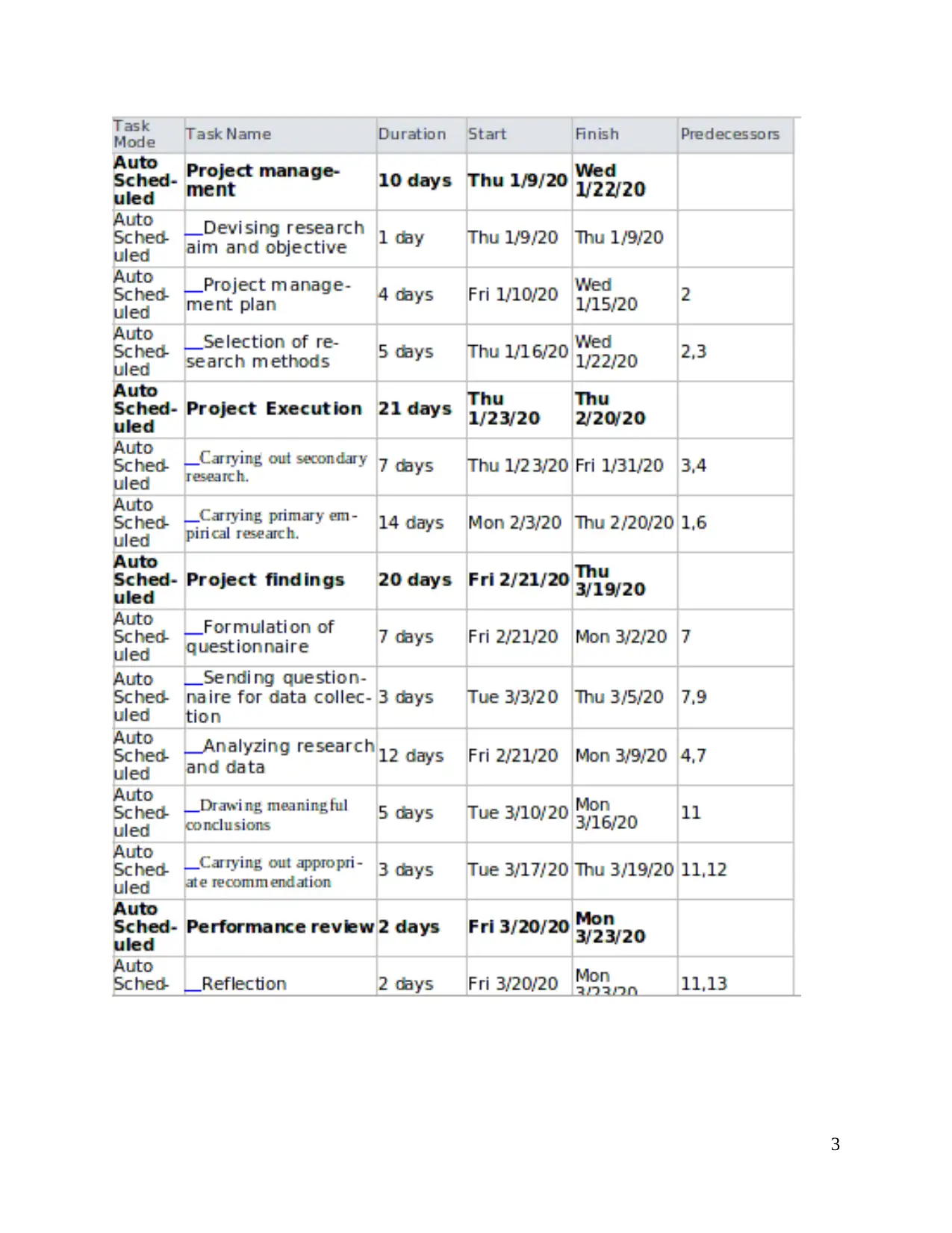
3
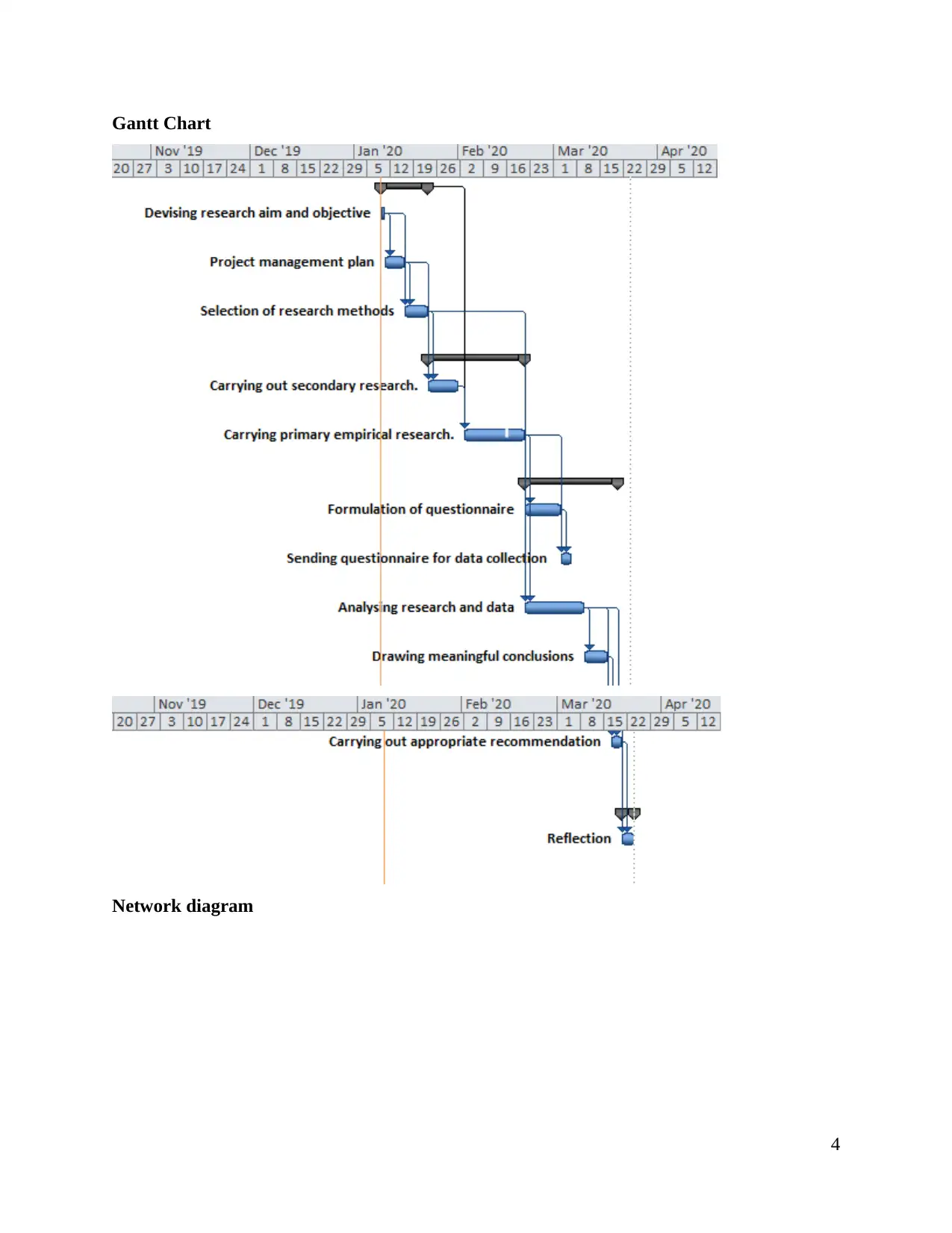
Gantt Chart
Network diagram
4
Network diagram
4
⊘ This is a preview!⊘
Do you want full access?
Subscribe today to unlock all pages.

Trusted by 1+ million students worldwide
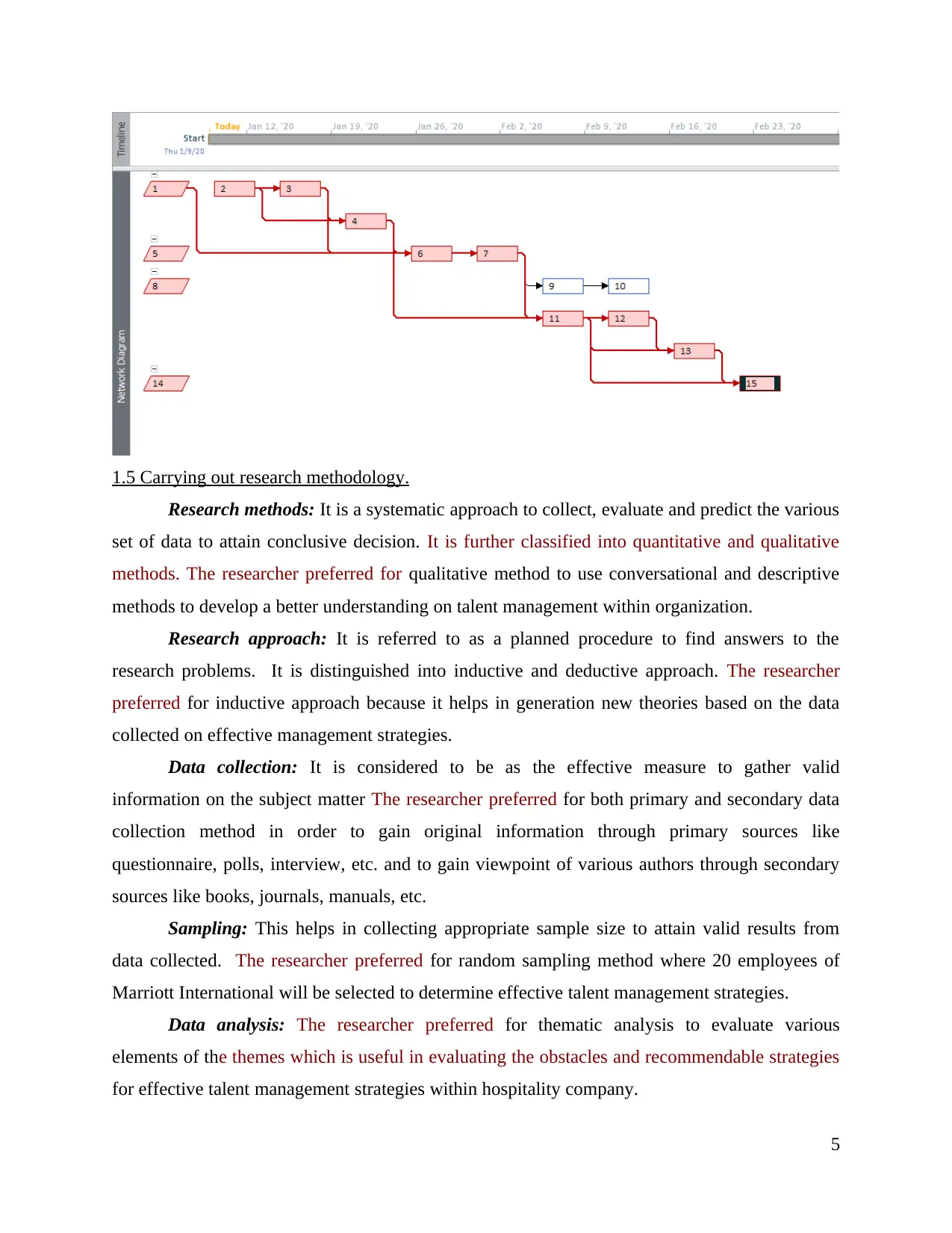
1.5 Carrying out research methodology.
Research methods: It is a systematic approach to collect, evaluate and predict the various
set of data to attain conclusive decision. It is further classified into quantitative and qualitative
methods. The researcher preferred for qualitative method to use conversational and descriptive
methods to develop a better understanding on talent management within organization.
Research approach: It is referred to as a planned procedure to find answers to the
research problems. It is distinguished into inductive and deductive approach. The researcher
preferred for inductive approach because it helps in generation new theories based on the data
collected on effective management strategies.
Data collection: It is considered to be as the effective measure to gather valid
information on the subject matter The researcher preferred for both primary and secondary data
collection method in order to gain original information through primary sources like
questionnaire, polls, interview, etc. and to gain viewpoint of various authors through secondary
sources like books, journals, manuals, etc.
Sampling: This helps in collecting appropriate sample size to attain valid results from
data collected. The researcher preferred for random sampling method where 20 employees of
Marriott International will be selected to determine effective talent management strategies.
Data analysis: The researcher preferred for thematic analysis to evaluate various
elements of the themes which is useful in evaluating the obstacles and recommendable strategies
for effective talent management strategies within hospitality company.
5
Research methods: It is a systematic approach to collect, evaluate and predict the various
set of data to attain conclusive decision. It is further classified into quantitative and qualitative
methods. The researcher preferred for qualitative method to use conversational and descriptive
methods to develop a better understanding on talent management within organization.
Research approach: It is referred to as a planned procedure to find answers to the
research problems. It is distinguished into inductive and deductive approach. The researcher
preferred for inductive approach because it helps in generation new theories based on the data
collected on effective management strategies.
Data collection: It is considered to be as the effective measure to gather valid
information on the subject matter The researcher preferred for both primary and secondary data
collection method in order to gain original information through primary sources like
questionnaire, polls, interview, etc. and to gain viewpoint of various authors through secondary
sources like books, journals, manuals, etc.
Sampling: This helps in collecting appropriate sample size to attain valid results from
data collected. The researcher preferred for random sampling method where 20 employees of
Marriott International will be selected to determine effective talent management strategies.
Data analysis: The researcher preferred for thematic analysis to evaluate various
elements of the themes which is useful in evaluating the obstacles and recommendable strategies
for effective talent management strategies within hospitality company.
5
Paraphrase This Document
Need a fresh take? Get an instant paraphrase of this document with our AI Paraphraser
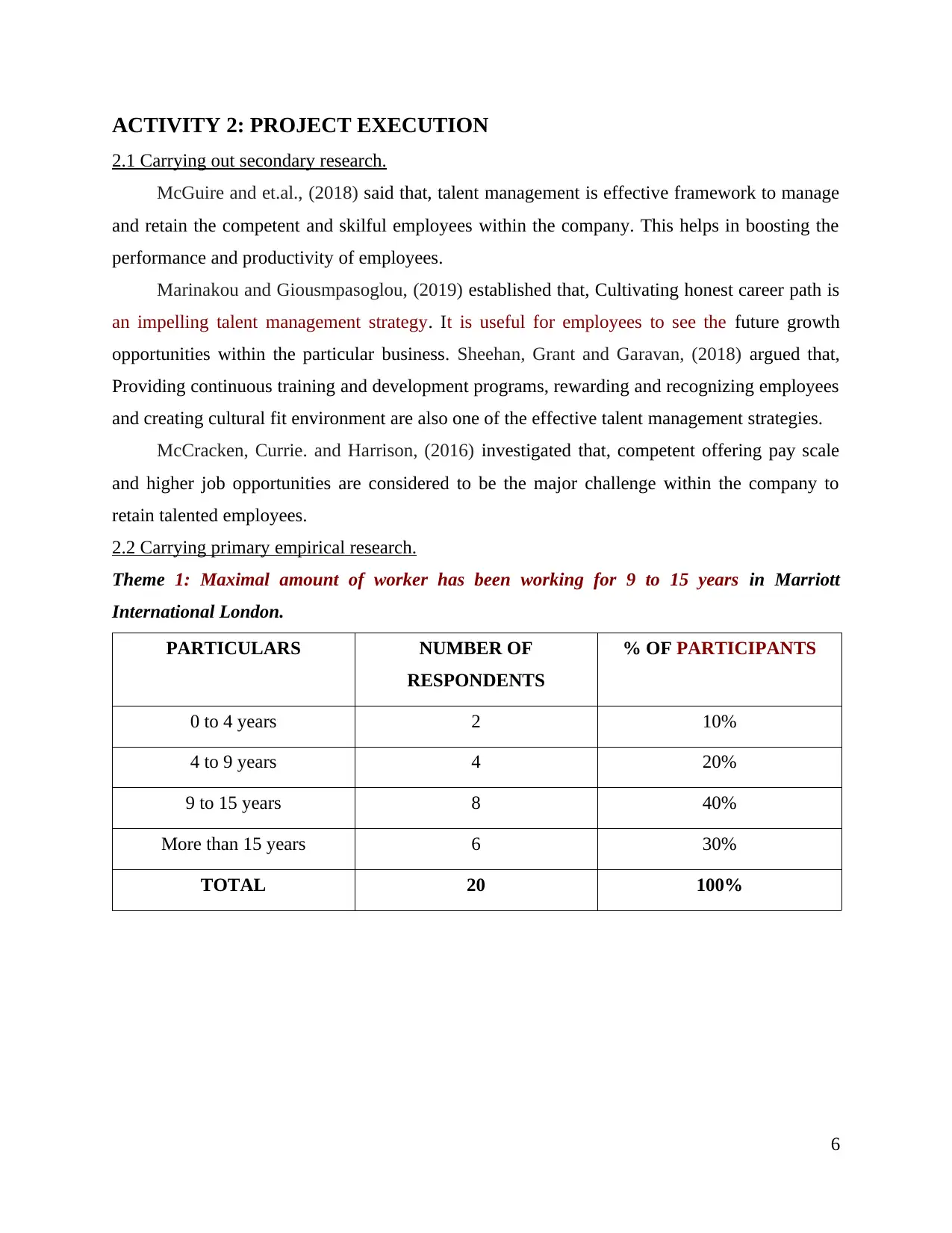
ACTIVITY 2: PROJECT EXECUTION
2.1 Carrying out secondary research.
McGuire and et.al., (2018) said that, talent management is effective framework to manage
and retain the competent and skilful employees within the company. This helps in boosting the
performance and productivity of employees.
Marinakou and Giousmpasoglou, (2019) established that, Cultivating honest career path is
an impelling talent management strategy. It is useful for employees to see the future growth
opportunities within the particular business. Sheehan, Grant and Garavan, (2018) argued that,
Providing continuous training and development programs, rewarding and recognizing employees
and creating cultural fit environment are also one of the effective talent management strategies.
McCracken, Currie. and Harrison, (2016) investigated that, competent offering pay scale
and higher job opportunities are considered to be the major challenge within the company to
retain talented employees.
2.2 Carrying primary empirical research.
Theme 1: Maximal amount of worker has been working for 9 to 15 years in Marriott
International London.
PARTICULARS NUMBER OF
RESPONDENTS
% OF PARTICIPANTS
0 to 4 years 2 10%
4 to 9 years 4 20%
9 to 15 years 8 40%
More than 15 years 6 30%
TOTAL 20 100%
6
2.1 Carrying out secondary research.
McGuire and et.al., (2018) said that, talent management is effective framework to manage
and retain the competent and skilful employees within the company. This helps in boosting the
performance and productivity of employees.
Marinakou and Giousmpasoglou, (2019) established that, Cultivating honest career path is
an impelling talent management strategy. It is useful for employees to see the future growth
opportunities within the particular business. Sheehan, Grant and Garavan, (2018) argued that,
Providing continuous training and development programs, rewarding and recognizing employees
and creating cultural fit environment are also one of the effective talent management strategies.
McCracken, Currie. and Harrison, (2016) investigated that, competent offering pay scale
and higher job opportunities are considered to be the major challenge within the company to
retain talented employees.
2.2 Carrying primary empirical research.
Theme 1: Maximal amount of worker has been working for 9 to 15 years in Marriott
International London.
PARTICULARS NUMBER OF
RESPONDENTS
% OF PARTICIPANTS
0 to 4 years 2 10%
4 to 9 years 4 20%
9 to 15 years 8 40%
More than 15 years 6 30%
TOTAL 20 100%
6
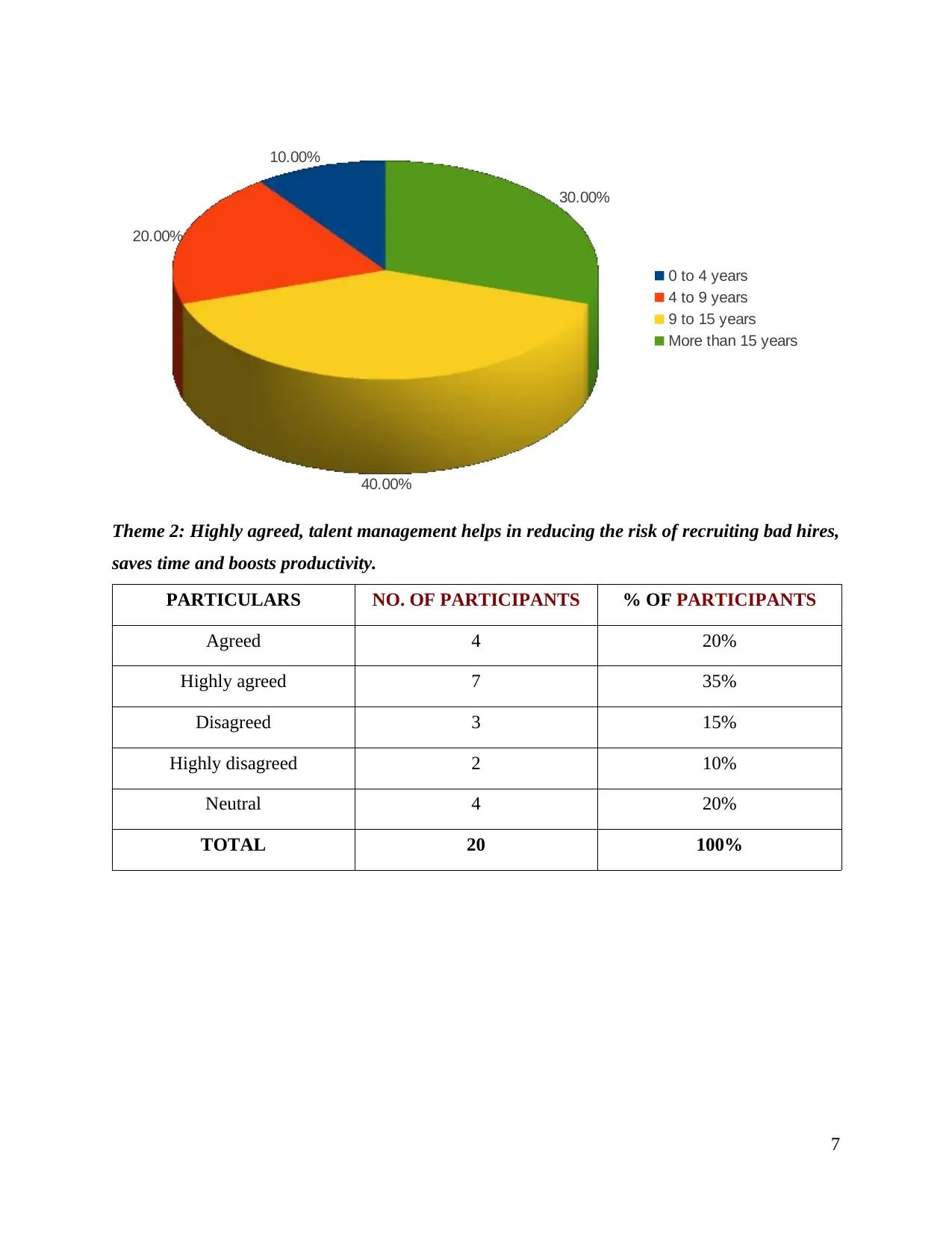
10.00%
20.00%
40.00%
30.00%
0 to 4 years
4 to 9 years
9 to 15 years
More than 15 years
Theme 2: Highly agreed, talent management helps in reducing the risk of recruiting bad hires,
saves time and boosts productivity.
PARTICULARS NO. OF PARTICIPANTS % OF PARTICIPANTS
Agreed 4 20%
Highly agreed 7 35%
Disagreed 3 15%
Highly disagreed 2 10%
Neutral 4 20%
TOTAL 20 100%
7
20.00%
40.00%
30.00%
0 to 4 years
4 to 9 years
9 to 15 years
More than 15 years
Theme 2: Highly agreed, talent management helps in reducing the risk of recruiting bad hires,
saves time and boosts productivity.
PARTICULARS NO. OF PARTICIPANTS % OF PARTICIPANTS
Agreed 4 20%
Highly agreed 7 35%
Disagreed 3 15%
Highly disagreed 2 10%
Neutral 4 20%
TOTAL 20 100%
7
⊘ This is a preview!⊘
Do you want full access?
Subscribe today to unlock all pages.

Trusted by 1+ million students worldwide
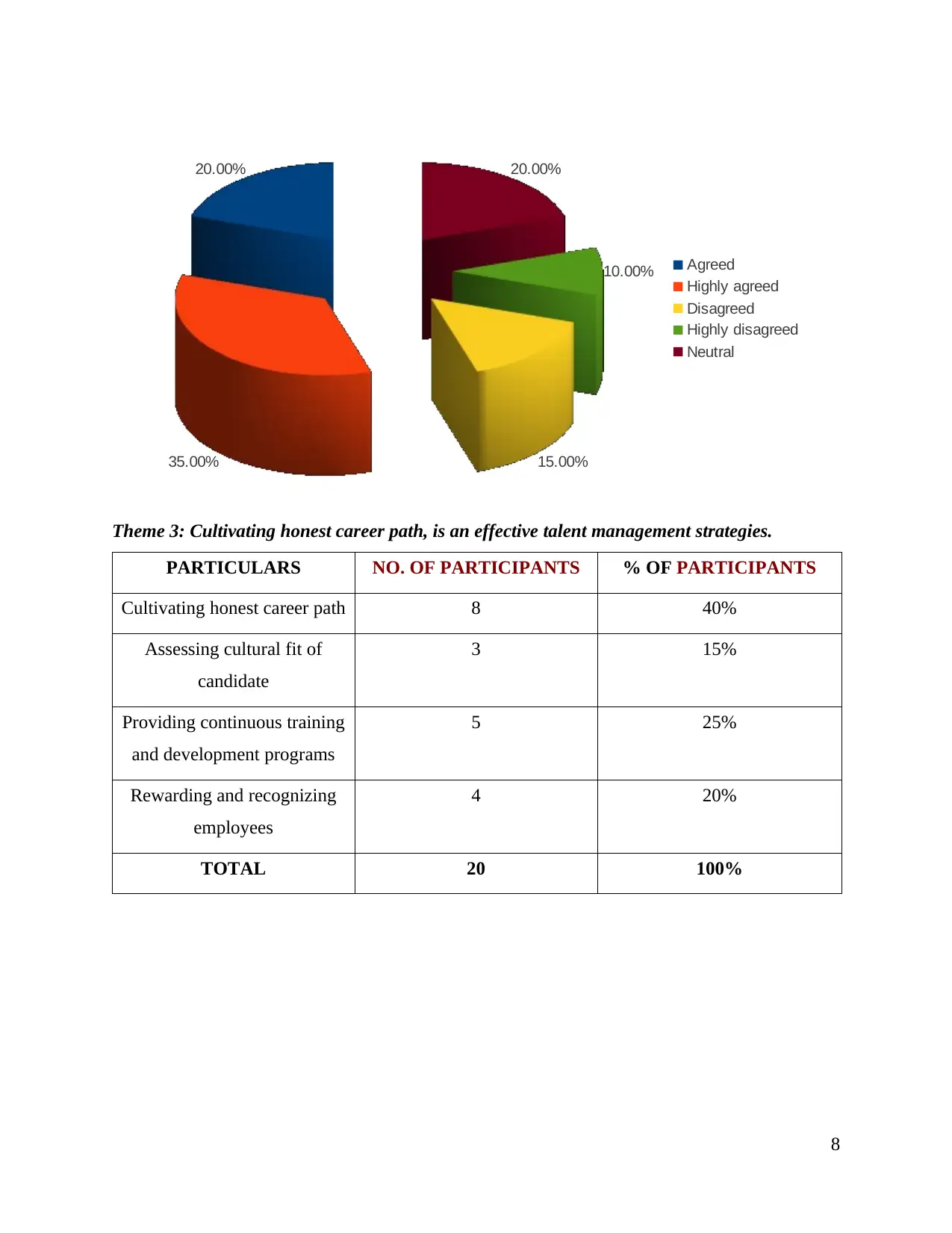
20.00%
35.00% 15.00%
10.00%
20.00%
Agreed
Highly agreed
Disagreed
Highly disagreed
Neutral
Theme 3: Cultivating honest career path, is an effective talent management strategies.
PARTICULARS NO. OF PARTICIPANTS % OF PARTICIPANTS
Cultivating honest career path 8 40%
Assessing cultural fit of
candidate
3 15%
Providing continuous training
and development programs
5 25%
Rewarding and recognizing
employees
4 20%
TOTAL 20 100%
8
35.00% 15.00%
10.00%
20.00%
Agreed
Highly agreed
Disagreed
Highly disagreed
Neutral
Theme 3: Cultivating honest career path, is an effective talent management strategies.
PARTICULARS NO. OF PARTICIPANTS % OF PARTICIPANTS
Cultivating honest career path 8 40%
Assessing cultural fit of
candidate
3 15%
Providing continuous training
and development programs
5 25%
Rewarding and recognizing
employees
4 20%
TOTAL 20 100%
8
Paraphrase This Document
Need a fresh take? Get an instant paraphrase of this document with our AI Paraphraser
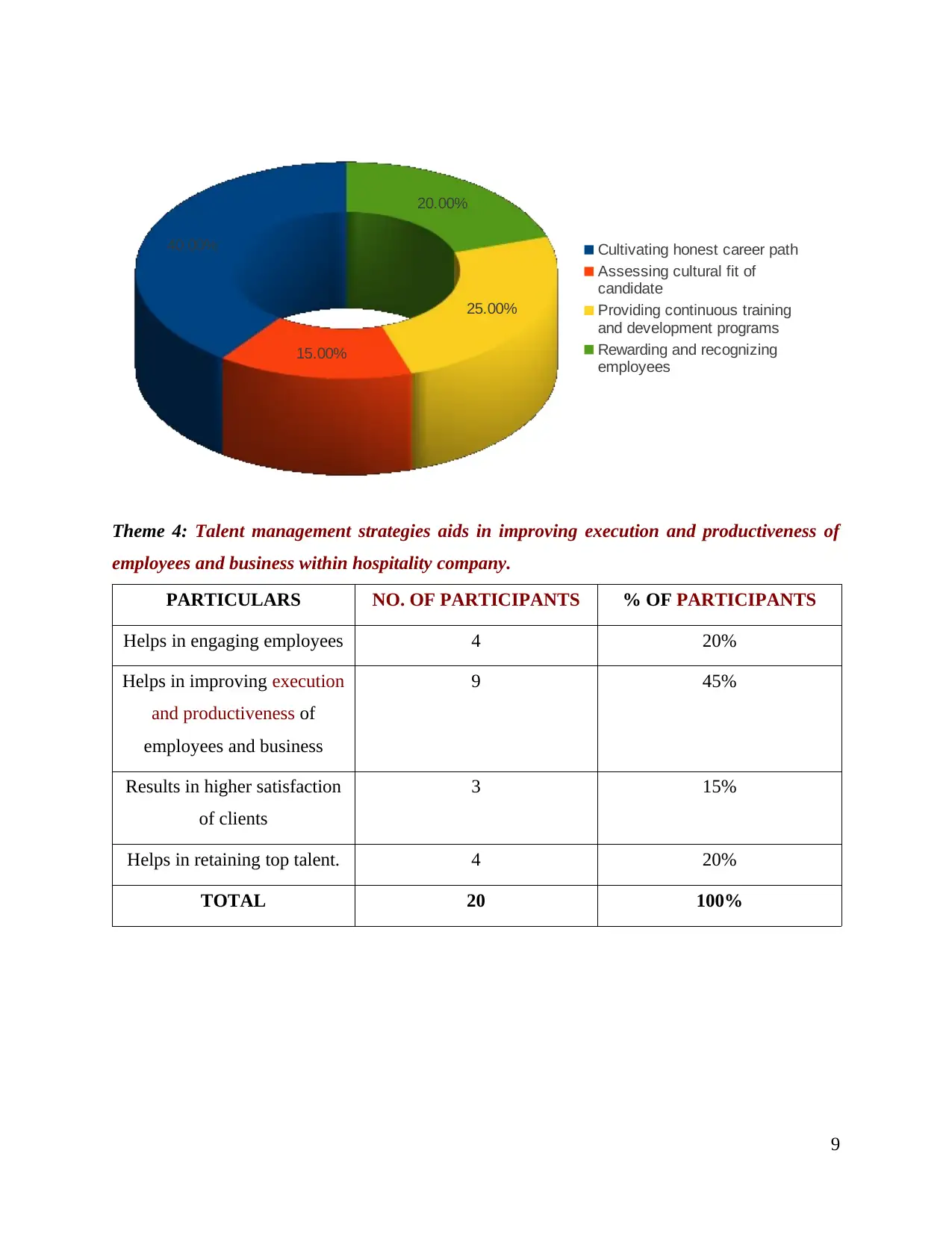
40.00%
15.00%
25.00%
20.00%
Cultivating honest career path
Assessing cultural fit of
candidate
Providing continuous training
and development programs
Rewarding and recognizing
employees
Theme 4: Talent management strategies aids in improving execution and productiveness of
employees and business within hospitality company.
PARTICULARS NO. OF PARTICIPANTS % OF PARTICIPANTS
Helps in engaging employees 4 20%
Helps in improving execution
and productiveness of
employees and business
9 45%
Results in higher satisfaction
of clients
3 15%
Helps in retaining top talent. 4 20%
TOTAL 20 100%
9
15.00%
25.00%
20.00%
Cultivating honest career path
Assessing cultural fit of
candidate
Providing continuous training
and development programs
Rewarding and recognizing
employees
Theme 4: Talent management strategies aids in improving execution and productiveness of
employees and business within hospitality company.
PARTICULARS NO. OF PARTICIPANTS % OF PARTICIPANTS
Helps in engaging employees 4 20%
Helps in improving execution
and productiveness of
employees and business
9 45%
Results in higher satisfaction
of clients
3 15%
Helps in retaining top talent. 4 20%
TOTAL 20 100%
9
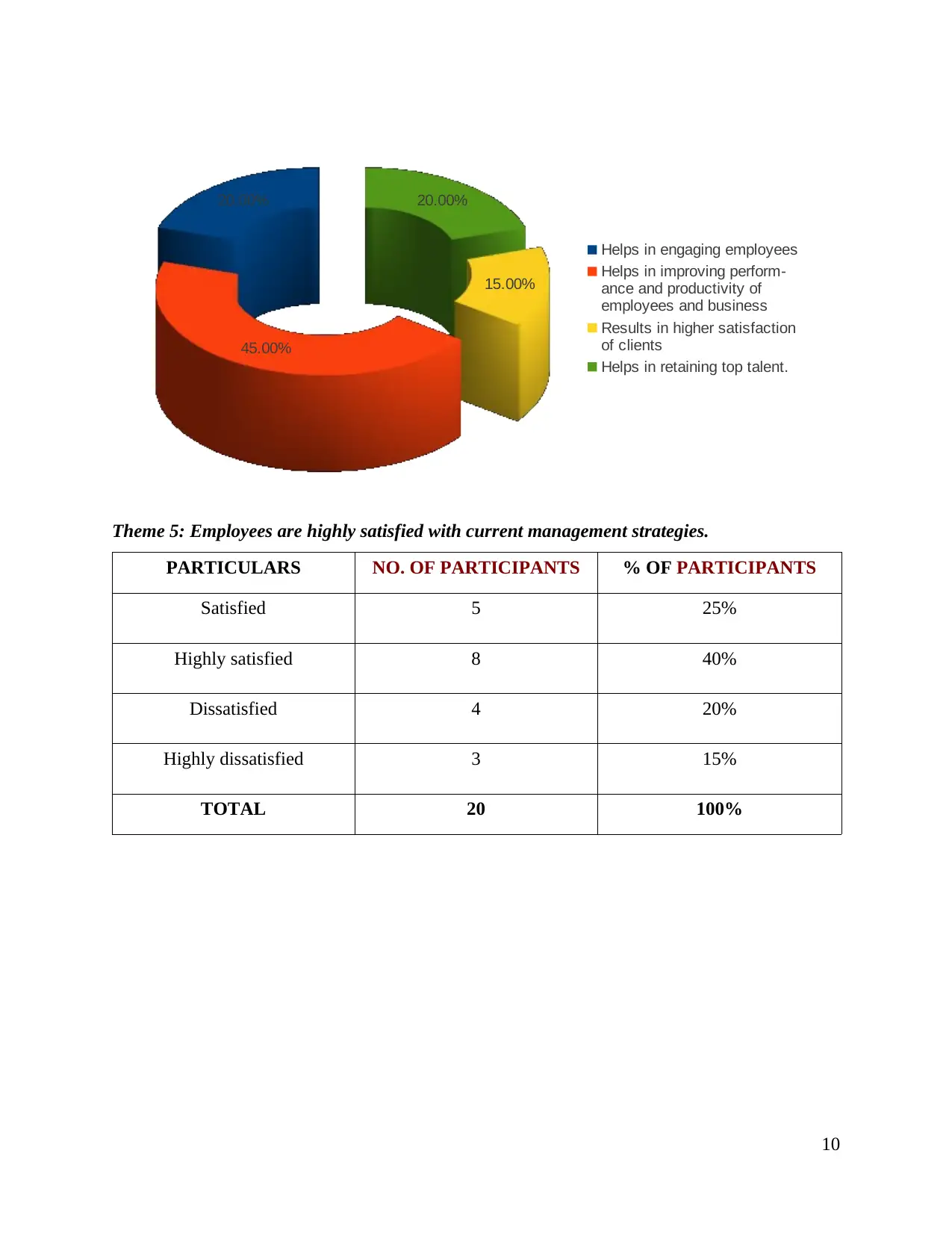
20.00%
45.00%
15.00%
20.00%
Helps in engaging employees
Helps in improving perform-
ance and productivity of
employees and business
Results in higher satisfaction
of clients
Helps in retaining top talent.
Theme 5: Employees are highly satisfied with current management strategies.
PARTICULARS NO. OF PARTICIPANTS % OF PARTICIPANTS
Satisfied 5 25%
Highly satisfied 8 40%
Dissatisfied 4 20%
Highly dissatisfied 3 15%
TOTAL 20 100%
10
45.00%
15.00%
20.00%
Helps in engaging employees
Helps in improving perform-
ance and productivity of
employees and business
Results in higher satisfaction
of clients
Helps in retaining top talent.
Theme 5: Employees are highly satisfied with current management strategies.
PARTICULARS NO. OF PARTICIPANTS % OF PARTICIPANTS
Satisfied 5 25%
Highly satisfied 8 40%
Dissatisfied 4 20%
Highly dissatisfied 3 15%
TOTAL 20 100%
10
⊘ This is a preview!⊘
Do you want full access?
Subscribe today to unlock all pages.

Trusted by 1+ million students worldwide
1 out of 20
Related Documents
Your All-in-One AI-Powered Toolkit for Academic Success.
+13062052269
info@desklib.com
Available 24*7 on WhatsApp / Email
![[object Object]](/_next/static/media/star-bottom.7253800d.svg)
Unlock your academic potential
Copyright © 2020–2025 A2Z Services. All Rights Reserved. Developed and managed by ZUCOL.





